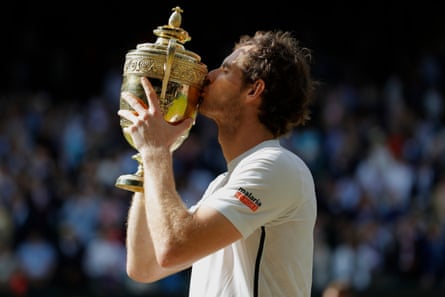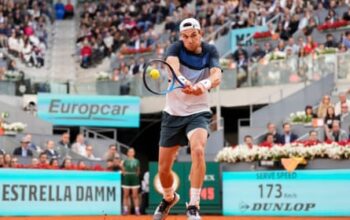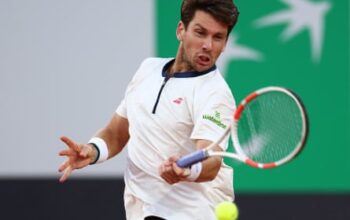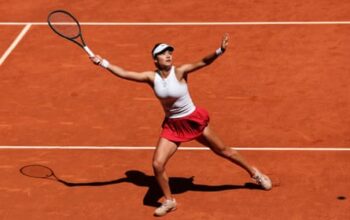Andy Murray has withdrawn from the early stages of the European clay-court season and continues to weigh up his options as he races to be fit for Wimbledon in the final months of his career after tearing ankle ligaments at the Miami Open last weekend.
As he considers his next move, Murray has now been ruled out until at least 21 April after his withdrawals from the Monte Carlo Masters, which begins in just over a week on 7 April, and the Munich ATP 250 event, which starts on 15 April. The next grand slam tournament, Roland Garros, begins on 26 May.
On Sunday, Murray suffered a full rupture of his anterior talofibular ligament (ATFL) and he also tore his calcaneofibular ligament (CFL), both ankle ligaments, in his dramatic 7-5, 5-7, 6-7 (5) loss to Tomas Machac of the Czech Republic in the third round of the Miami Open.
Murray had been playing his best tennis of an otherwise difficult season in Miami but just as the 36-year-old’s fortune turned, he suffered a grim setback. He had launched a late comeback from 2-5 down in the third set but he badly hurt his right ankle as he levelled the match at 5-5. Although he fought until the end without even bandaging his ankle, and he nearly won the match, Murray later announced the ligament tear.
After running tests in Miami the following day, Murray consulted with experts on his return to the UK. Depending on the injury itself, a ruptured ATFL could potentially heal with rest and rehab or through keyhole surgery, which could see him out for several months. Murray is yet to decide on his next course of action, but for the time being it appears he is pursuing more conservative treatment.
In an update on Friday, Murray’s management described his situation as very disappointing, but it noted that he is determined to return to the court as soon as he can.
“At this stage, it is still not clear how long Andy will be out of action, and he is continuing to review options with his medical team,” the update read. “Obviously this is very disappointing news for Andy and he has reiterated his desire to get back on court as soon as possible.”
The occurrence of this injury, probably the most significant Murray has suffered since undergoing hip resurfacing surgery in January 2019, is particularly notable considering its timing. The three-time grand slam champion had only recently publicly confirmed his plans to retire at the end of this summer after significant speculation and questions.
After his defeat in Miami, before he knew the full extent of the injury, Murray gave his most definitive statement on the issue: “I am looking forward to the end now, give my best for the next few months and then getting to be at home with my family.”
In his final year on tour, Murray had seemingly planned to embark on his longest clay season since his hip problems began, culminating in Roland Garros. But the most significant event of the summer is, of course, on home soil at Wimbledon, where Murray is a two-time champion and he still considers himself one of the best players in the world on grass.
Wimbledon is now only three months away, and not only is his participation up in the air, but he is also desperate to ensure that he actually arrives at the grass-court season in good playing shape in order to give himself the best chance of a last resurgent run.
after newsletter promotion
It is unclear where Murray intends to stop, but there will be plenty more to play for if he is fit, 12 days after Wimbledon ends, the Paris Olympics begin. As a two-time Olympic singles gold medallist and a mixed doubles silver medallist, Murray also values the Olympics highly, but he has stated that he only intends to play if he has a chance of winning a medal.

Even if Murray narrowly misses the entry cutoff for the Olympics, he would still be eligible for a quota place as a former Olympic gold medallist and grand slam champion. A more realistic chance of an Olympic medal on clay at Roland Garros, though, would come in the men’s doubles competition. As a top-10 player, Great Britain’s Joe Salisbury, the world No 6, can choose any top-300 player to partner him. Rekindling his partnership with Murray from the Tokyo Games, where they narrowly lost in the quarter-finals, seems like the smartest move.
The final grand slam tournament of the year, the US Open, is also extremely meaningful for Murray being where, 12 years ago, he finally won his first major title in New York.
Midway through his match against Machac in Miami, it felt like Murray was turning a corner. Instead, all of those positives from his level and enduring appetite for battle were vanquished in an instant by this unexpected injury, and it remains to be seen if he will be able to proceed with his planned retirement timeline in the manner he had hoped. In the coming weeks and months, Murray will have to make significant decisions about his farewell season.


